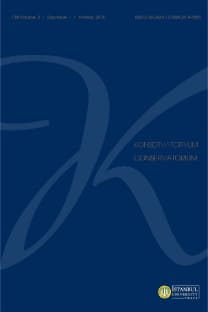Tiyatroda Ekspresyonizm ve Bir Oyun Örneği: Machinal (Mekanik)
Bu makalede ekspresyonist sanatın, sanatçının nesne karşısında içsel tutumlarını dışavurumu ve bunun tiyatro sanatında parçalı yazım tekniği, çeşitli ses efektlerinin sahnelemede önem arz etmesi ve toplumsal düzendeki çatlaklara karşı çıkış bağlamında Sophie Treadwell’in Machinal adlı oyunu incelenmiştir. Oyunun anlatım tekniği açısından gerçeklik yapısını bozması, Treadwell’in vurgulamaya çalıştığı düşünceleri açığa çıkardığı düşünülmüş ve bu sebeple özellikle bu gerçeklikten kopuş anlarının görünür kıldığı faraziyeler, içselleştirilmiş ve sorgulanmamış halde kabul edilmesine karşı yeni bir bakış açısı oluşturmanın yolları aranmıştır. Metinde, kadın algısının tekdüze ve ikincil oluşunun altının çizildiği anlaşılmıştır. Bu bilgi de yazarın, oyununu feminist perspektiften yola çıkarak alışagelmiş kadın faraziyelerinin gerçekliğini sorgulamak ve belki yıkmak üzere kurguladığı fikrini doğurmuştur. Ayrıca yazar, kadın odaklı bir hikâye anlatırken, kadın ve siyahi, rahip ve erkek eşleştirmeleri yaparak toplumdaki baskın ve öteki karakterleri ortaya koymuştur. Aslında başlı başına sistem eleştirisi olan oyun, sanayileşmenin getirdiği mekanikleşmeyi, insan ruhuna ve davranışlarına da yansıtmış, bu yansıtışı sahne üzerinde aktörlerin kesik hareket ve parçalı bütünlüksüz ve iletişimsiz konuşmalarıyla göstermek istemiştir.
Anahtar Kelimeler:
Ekspresyonizm, Sophie Treadwell, Machinal
Expressionism in the Theatre and an Example of a Play: Machinal
In this article, Sophie Treadwell’s play Machinal is examined in the context of expressionist art as it expresses the artist’s inner attitude towards the object. The play is also examined in the light of its fragmented writing technique, and importance is given to various sound effects in the staging which seem to reflect cracks in the social order. The play’s disruption of the structure of reality in terms of the narrative technique is considered to reveal the thoughts that Treadwell tried to emphasize, and therefore the ways of creating a new perspective against the acceptance of the postulates made visible by the moments of detachment from this reality are sought. It is understood in the text that the perception of women is uniform and secondary. This also gives rise to the idea that the writer, based on a feminist perspective, was constructed to question and perhaps demolish the reality of conventional female hypotheses. In addition, while the playwright tells a woman-oriented story, she also reveals the dominant characters in society by making pairs of women and African Americans, priests and men. In fact, the play, which is a system criticism in itself, reflects the mechanization brought by industrialization to human spirit and behavior and attempts to show this reflection on the stage by means of the actors’ interrupted movements as well as their fragmented and distorted speeches.
Keywords:
Expressionism, Sophie Treadwell, Machinal,
___
- Burger, J. M. (2006). Kişilik (İ. D. Erguvan Sarıoğlu, Çev.). İstanbul: Kaknüs Yayınları.
- Bywaters, B. L. (1990). Marriage, madness and murder in Sophie Treadwell’s Machinal. In J. Schlueter (Ed.), Modern American Drama: The Female Canon. Rutherford, NJ: Fairleigh Dickinson University Press.
- Dickey, J. (1997). The ‘Real Lives’ of Sophie Treadwell: Expressionism and feminist aesthetic in machinal and for saxophone. In J. C. Reesman (Ed.), Speaking the Other Self: American Women Writers. Athens: University of Georgia Press.
- Dickey, J. (1999). The expressionist moment: Sophie Treadwell. In B. Murphy (Ed.), American Women Playwrights. Cambridge: Cambridge University Press.
- Jones, J. (1994). In Defense of the woman: Sophie Treadwell’s machinal. Modern Drama, 37(3), 485-496. Moran, B. (2014). Edebiyat kuramları ve eleştiri. İstanbul: İletişim Yayınları.
- Richard, L. (1999). Ekspresyonizm sanat ansiklopedisi (B. Madra, S. Gürsoy, İ. Usmanbaş, Çev.). İstanbul: Remzi Kitabevi.
- Smith, R. J. B. (1987). The ınfluence and effect of german expressionist drama on theatrical practice in britain and the United States 1910-1940 (Doctoral dissertation, Royal Halloway and Bedford New College, University of London, London). Retrieved from https://repository.royalholloway.ac.uk/items/029505a4-509f-4f19-a34f48048816d96b/1/
- Şener, S. (2008). Dünden bugüne tiyatro düşüncesi. Ankara: Dost Kitabevi.
- Tancheva, K. (2003). Sophie Treadwell’s play machinal: Strategies of reception and ınterpretation. In A. Gewirtz & J. J. Kolb (Eds.), Experimenters, Rebels and Disparate Voices: The Theatre of the 1920s Celebrates American Diversity (pp. 10-110). Westport-Connecticut: Preager.
- Treadwell, S. (1993). Machinal. London: Nick Hern Books.
- ISSN: 2146-264X
- Yayın Aralığı: Yılda 2 Sayı
- Başlangıç: 2011
- Yayıncı: İstanbul Üniversitesi Devlet Konservatuvarı
Sayıdaki Diğer Makaleler
Tiyatroda Ekspresyonizm ve Bir Oyun Örneği: Machinal (Mekanik)
Çarkçı Bale Lisans Öğrencileri Performans Kaygısı Ölçeği’ Geçerlik Güvenirlik Çalışması
Jaklin ÇARKÇI, Çare SERTELİN MERCAN
Meisner ve Adler’in Oyuncunun Sahne Üzerindeki Gerçeklik Algısına Yaklaşımlarının Değerlendirmesi
Sahne Sanatlarının Eşikselliği: Geçiş Ritüelleri Bağlamında Bir Alan Araştırması
‘Çarkçı Bale Lisans Öğrencileri Performans Kaygısı Ölçeği’ Geçerlik Güvenirlik Çalışması
